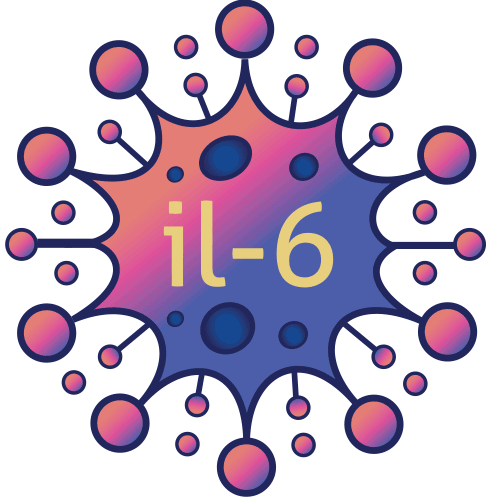Lupus: The Link to IL-6 Levels
- From The Mind of AI

- Nov 18, 2024
- 3 min read
Updated: Dec 30, 2024

Lupus, or systemic lupus erythematosus (SLE), is a chronic autoimmune disease that affects multiple organs and tissues in the body, leading to widespread inflammation and tissue damage.
Research highlights a strong connection between elevated levels of Interleukin-6 (IL-6), a pro-inflammatory cytokine, and the progression and severity of lupus. Elevated IL-6 levels contribute to immune dysregulation, organ damage, and increased disease activity. Understanding and managing IL-6 levels may help reduce symptoms and improve quality of life for lupus patients.
What is IL-6?
IL-6 is a cytokine involved in regulating immune responses and inflammation. While it plays a crucial role in fighting infections, persistently high IL-6 levels contribute to autoimmune diseases like lupus by promoting chronic inflammation and overactivation of the immune system. Elevated IL-6 levels in lupus are associated with increased disease activity, including joint pain, fatigue, and organ damage.
IL-6 and Lupus
Studies show that IL-6 contributes to lupus progression through several mechanisms:
Autoimmune Dysregulation: IL-6 promotes the production of autoantibodies that attack the body’s tissues.
Inflammation and Organ Damage: High IL-6 levels drive inflammation in multiple organs, including the kidneys, skin, and joints.
Fatigue and Malaise: Elevated IL-6 levels are associated with chronic fatigue and systemic inflammation in lupus patients.
Disease Flare-Ups: IL-6 levels often rise during lupus flares, worsening symptoms and complications.
Supplements for Reducing IL-6 Levels in Lupus
Supplement | Benefits | Recommended Dosage |
NAD+ | - Reduces IL-6 production and systemic inflammation.- Supports cellular repair in tissues affected by lupus-related damage.- Enhances mitochondrial function, reducing fatigue. | 300 mg to 600 mg daily |
Curcumin | - Inhibits IL-6 and TNF-alpha production.- Reduces oxidative stress and inflammation in organs. | 500 mg to 1,000 mg daily |
Omega-3 Fatty Acids | - Provides anti-inflammatory effects and improves immune regulation.- Reduces joint inflammation and pain. | 1,000 mg to 2,000 mg daily |
Vitamin D | - Modulates immune function and reduces autoimmune responses.- May lower IL-6-driven inflammation. | 2,000 IU to 5,000 IU daily |
Additional Key Supplements for Lupus
Supplement | Benefits | Recommended Dosage |
Quercetin | - Reduces oxidative stress and inhibits IL-6 signaling pathways.- Supports immune balance and organ health. | 500 mg to 1,000 mg daily |
Coenzyme Q10 (CoQ10) | - Improves cellular energy production and reduces fatigue.- Protects healthy tissues during flares. | 100 mg to 300 mg daily |
Magnesium | - Decreases IL-6 production and relaxes muscles, reducing joint stiffness and pain. | 300 mg to 400 mg daily |
Boswellia | - Reduces inflammation in the joints, skin, and other affected tissues. | 300 mg to 500 mg daily |
NAD+ and Its Benefits for Lupus
NAD+ offers significant potential as a supportive therapy for lupus management:
Reduces Inflammation: Inhibits IL-6 production and other inflammatory cytokines, reducing systemic inflammation.
Supports Cellular Repair: Enhances the repair of tissues damaged by autoimmune attacks, including skin, kidneys, and joints.
Improves Energy Levels: Boosts mitochondrial function, combating fatigue and improving overall resilience.
Protects Against Flares: NAD+ may help stabilize immune function and reduce the frequency and severity of lupus flares.
Lifestyle Modifications to Reduce IL-6 Levels
Lifestyle Modification | Description |
Anti-Inflammatory Diet | Focus on whole, nutrient-dense foods like vegetables, fruits, lean proteins, and healthy fats while avoiding processed foods and sugars. |
Regular Exercise | Low-impact activities like swimming, yoga, or walking can reduce joint stiffness and systemic inflammation. |
Stress Management | Chronic stress elevates IL-6. Practice mindfulness, deep breathing, or journaling to reduce stress. |
Adequate Sleep | Proper sleep helps regulate immune responses and reduce inflammatory markers like IL-6. |
Sunlight and Vitamin D | Moderate sun exposure can boost vitamin D levels, which are often low in lupus patients and critical for immune regulation. |
Hope for Lupus Patients
Targeting IL-6 levels in lupus patients offers a promising strategy to manage symptoms, reduce disease activity, and improve quality of life. By incorporating supplements like NAD+, lifestyle modifications, and appropriate medical treatments, individuals can lower inflammation and mitigate the effects of lupus. As research into IL-6 modulation continues, new therapies and insights hold the potential to further enhance outcomes for lupus patients.




Comentarios